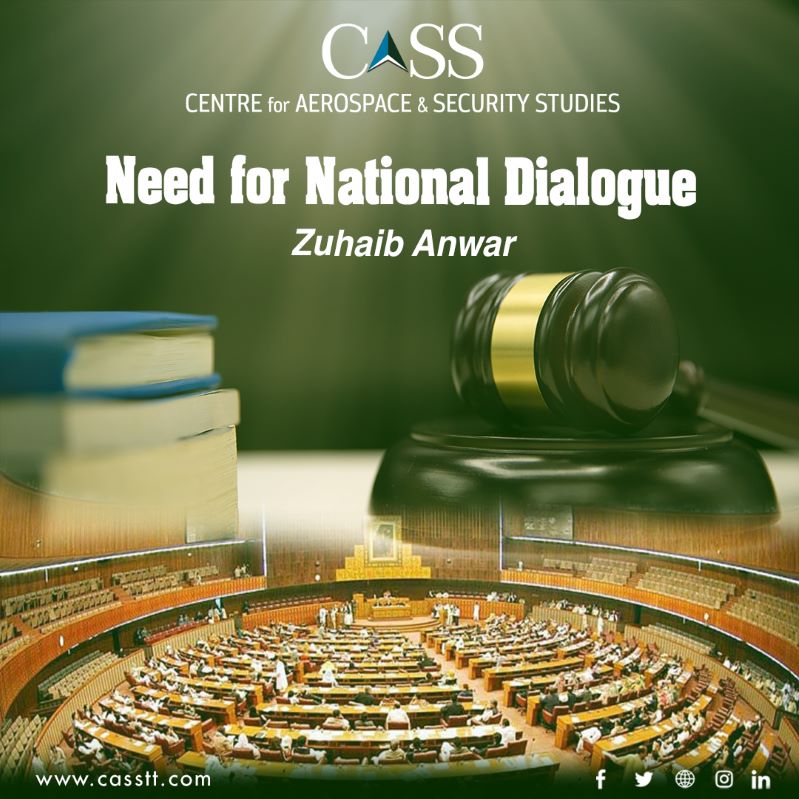Although the state of Pakistan has always been in a never-ending crisis since its inception (or that is what generations of Pakistanis have experienced), the irony is that never has anyone been held accountable for putting the country in these situations. What’s worse, a blame game continues till date, where successive governments blame their predecessors for the mess. For more than half of its history, Pakistan has been ruled by military dictators, who also cannot be absolved from their role in our turbulent and traumatic past. Pakistan is again, unfortunately, passing through tough times owing to political polarisation, economic instability and resurgence of terrorism.
Political polarisation has reached to a level where the opposition and government are unwilling to even sit and talk through their contentious, at times, petty issues. The primary objective of both sides is to hold or gain power. No side is thinking about the miseries faced by ordinary citizens of the state.
Similarly on the economic front, the situation is highly discouraging. While inflation has reached a record high, the value of rupee is continuously falling, and our foreign exchange reserves are at an extremely low level. The problem with the economic situation is that Pakistan produces less and consumes more and is excessively reliant on loans to run state affairs and thus, debt has increased exponentially. Last year, this situation worsened due to catastrophic floods at the domestic level and the rise in global food and fuel prices because of the Russia-Ukraine War. These factors have led to an unprecedentedly dismal economic situation in Pakistan.
More recently, encouraged by the establishment of Taliban government in Afghanistan, Tehreek-i-Taliban Pakistan (TTP), the terrorist organisation responsible for the death of thousands of Pakistanis, has regrouped and once again initiated its heinous activities. Various attempts to negotiate with the TTP (upon repeated propositions from Afghan Taliban) have failed. These negotiations were bound to fail because TTP has not been willing to accept the Constitution of Pakistan as the ultimate canonical document of the state. Last year, TTP was responsible for at least 150 attacks inside Pakistan, resulting in more than 150 deaths. These attacks continue till date, the latest on a mosque in Police Lines Peshawar where a suicide bomber detonated himself during mid-day prayer congregation, martyring more than 100 worshippers.
In Pakistan, when a government is elected or comes to power through a coup d’état, it gets busy making efforts to legitimise itself, complete or prolong its term rather than focusing on national development and/or economic uplift. This results in chaos at the domestic level and exposes vulnerabilities that are exploited by external forces.
In order to find a way out of this incessant situation, there is a dire need to initiate a national dialogue. The focus of this dialogue should be political stability, economic revival, rule of law, curbing terrorism, etc. Redefining the role of every state institution and then binding each to its constitutional role may also be a part of this discussion. In short, the focus of this entire exercise should be to reform the governance of the country.
While several national think tanks have been working towards this end, they have had limited impact, thus far, due to certain lacunas. The problem is who hosts/moderates such a dialogue and who should take part in it.
Given the growing hostilities between state institutions and political parties, no state institution or political figure can host it. At several forums, organised by the Centre for Aerospace & Security Studies, it has been recommended that well-respected, apolitical people from civil society should voluntarily step forward to host such a dialogue. All stakeholders, including the incumbent government, opposition, and other national-level political parties, along with representatives from the judiciary, Armed Forces and intelligence agencies, should be invited to participate. There should be open and free discussion about the issues faced by Pakistan. The dialogue should end with a consensus roadmap document with defined objectives ending the political polarisation, reviving the economy, drawing clear and definite boundaries for all state institutions, an agreement for revamping the judicial system to provide speedy justice to people, a plan to deal with the menace of terrorism and a comprehensive check and balance mechanism to ensure adherence by all parties involved. The next important step would be the implementation of the agreed roadmap. The decisions of the dialogue should be given legal cover and accountability mechanisms, making it binding on all stakeholders to implement the agreed upon measures.
The current situation calls for serious deliberation on how Pakistan can move forward from where it is right now rather than beating the old drum of ‘who is responsible’ since in case of the latter, perhaps each and every one of us is responsible, in one way or the other. The dialogue may give hope to the people of Pakistan assuring them that serious efforts are being made to bring the country out of this unending cataract of crises.
Zuhaib Anwar is a Research Assistant at the Centre for Aerospace & Security Studies (CASS), Islamabad, Pakistan. He can be reached at [email protected].





